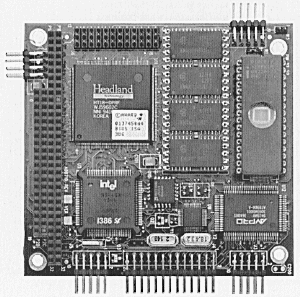
CoreModule/386-II Ultra-compact PC/AT-compatible, stackable module Includes all PC/AT motherboard functions: - 25 MHz CMOS 386SX CPU - Up to 16M bytes onboard DRAM - 16-bit expansion bus Other built-in functions - Dual serial and parallel controller Bootable "Solid State Disk" Watchdog Timer Ultra compact PC/104 form-factor: 3.6 x 3.8 inches (90 x 96 mm) Low power consumption (3.5 watts) Stackable PC/104 expansion The CoreModule/386-II offers complete PC/AT compatibility in a compact, preconfigured module. Within just 14 square inches of space, the CoreModule/386-II includes the equivalent functions of a PC/AT motherboard plus several additional expansion cards. Performance-critical embedded applications that formerly required chip-based custom designs can now benefit from an off-the-shelf module with the power of a 25 MHz 80386SX CPU, along with hardware and software standards like PC/AT and MS-DOS compatibility. The CoreModule/386-II is designed to meet the demands of embedded systems. through its extreme compactness, low power consumption. +5V-only operation, wide operating temperature range, and high reliability. *Configuration Flexibility* The CoreModule/386-II can be used as a macrocomponent, plugged into a proprietary application board, or it can be combined with Ampro's PC/104- compatible MiniModule expansion products to form compact, highly integrated control subsystems. Multiple modules can be stacked together without the cost and space penalties of additional mounting hardware, or they can be separately mounted on a custom circuit board. *Solid State Disk Reliability* One of the unique features of the CoreModule/386-II is its byte-wide memory device socket that is typically used as a Solid State Disk (SSD), substituting EPROM, Flash EPROM, or nonvolatile RAM (NOVRAM) memory devices for conventional disk drives. Using Ampro's SSD Support Software, any DOS-based-softwareincluding the operating system, programming languages, drivers, and application programscan easily be run from SSD without modification. *Enhanced BIOS* Another very important feature of the CoreModule/386-II is its inclusion of enhanced BIOS services and functions that meet the unique requirements of embedded microcomputer system applications. A partial list of these BIOS enhancements appears in the specifications section of this data sheet. SPECIFICATIONS AT MOTHERBOARD FUNCTIONS 80386SX CPU, 25 MHz Connector for 80387SX math coprocessor adapter System DRAM: 2M bytes directly surface- mounted, or 4, 8, or 16M bytes via soldered on DRAM module 7 DMA channels (8237 equivalent) 15 interrupt channels (8259 equivalent) 3 programmable counter/timers (8254 cquivalent) AT-compatible keyboard port Speaker port with 0.1 watt drive Real time clock with CMOS RAM (MC146818 equivalent): requires external 3.0-3.6V battery (Tadiran TL-5242/W or equivalent) Battery-free operation option Award ROM BIOS with Ampro extensions ADDITIONAL ONBOARD FUNCTIONS Two PC-compatible COM ports with full handshaking: One serial port 16C450 equivalent One serial port 16C550 equivalent with 16 byte data FIFOs Onboard generation of +9V for RS232C signal levels Serial ports support RS232 (direct cabling) or RS485 (via the Ampro RS485 Adapter) Parallel printer port with bidirectional data lines One byte-wide memory socket: Usable with 32K-1M byte EPROMs, 32K-512K Flash EPROMs, 32K-512K SRAMs, or 1M-2M Eurom DiskOnChip RTC backup battery converts SRAM to NOVRAM Onboard programming of 12V Flash EPROMs Software-controlled write protect Configurable as 32K-, 64K-, or 128K-byte window, addressed in the range D0000-EFFFFh 2K bit configuration EEPROM, with 512 bits available for OEM use Onboard programmable watchdog timer BIOS ENHANCEMENTS Solid State Disk (SSD) support: substitutes EPROM or NOVRAM devices for normal floppy drives; SSDs may coexist with standard floppy and/or hard disk drives SCSI services: supports DOS-based system operation using a wide variety of SCSI drives: adds a unique SCSI/BIOS function to simplify development of custom SCSI applications; SCSI and IDE hard disks may coexist Watchdog timer support: initializes optional onboard watchdog timer; adds BIOS function for use by application software Serial console option: substitutes an ASCII terminal or other serially-connected device for the standard AT keyboard and display Battery-free boot: allows the system to boot and operate without a battery (or when the battery fails) Serial loader: allows download of executable code from a remote device prior to system boot EEPROM access function: provides high level access to the 512-bit nonvolatile OEM data area in the configuration EEPROM OEM "hooks": execute custom code prior to system boot; allows system customization without BIOS modification MECHANICAL AND ENVIRONMENTAL Size: 3.6 x 3.8 x 0.9 in. (90 x 96 x 23 mm) PC/104 Bus: 16-bit double-stackthrough Power requirement: +5V +/-5% at 690 mA (typical, includes 2M RAM) +12V required tor 12V-Flash device programming Operating environment: 0¡ to 70¡C temperature 5% to 95%, relative humidity, non-condensing Storage temperature: -55¡ to +85¡C Weight: 2.96 oz. (83 gm) NOTE: Contact Ampro tor custom configurations and extended temperature intormation. ORDERING INFORMATION When ordering, refer to the following, model numbers: CM2-3SX-K-74 Development Kit, CoreModule/386-II, 4M RAM CM2-3SX-K-75 Development Kit, CoreModule/386-II, 8M RAM CM2-3SX-K-76 Development Kit, CoreModule/386-II, 16M RAM CM2-3SX-Q-73 CoreModule/386-II, 2M RAM (Quantity Orders) CM2-3SX-Q-74 CoreModule/386-II, 4M RAM (Quantity Orders) CM2-3SX-Q-75 CoreModule/386-II, 8M RAM (Quantity Orders) CM2-3SX-Q-76 CoreModule/386-II, 16M RAM (Quantity Orders) C8L-XTP-Q-01 CoreModule cable set (2 serial, parallel, utility, and DC power) ACC-MCC-Q-06 80387SX math coprocessor carrier CoreModule/3X6-II Development Kits include: CoreModule/386-II with either 4M-, 8M-, or 16M bytes RAM, DR DOS operating system, interface cable set (2 serial, parallel, utility, and DC power), backup battery, math coprocessor carlier, technical manuals, utility software, and mounting hardware. Quantity ordels include the CoreModule/386-II with your choice of either 2M, 4M, 8M, or 16M bytes RAM and mounting hardware. To make a development system, you install the CoreModule/386-II Dcvelopment Kit on a CoreModule Development Chassis along with the MiniModule disk interface controller and display controller of your choice. Development Chassis EXP-CHS-K-71 CoreModule Development Chassis (110V) EXP-CHS-K-72 CoreModule Dcvelopment Chassis (220V) The CoreModule Development Chassis includes a module carrier board (provides two headers for stacking CoreModule and MiniModules), 50W power supply, 1.2M floppy drive, 2-slot backplane, all appropriate interface and power cables, and technical manual. Please contact your local Ampro representative or Ampro Sales Administration for ordering information.
Last modified: Tue Sep 5 23:02:14 1995